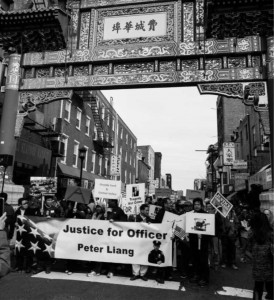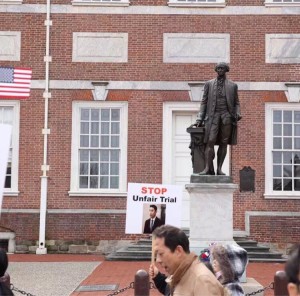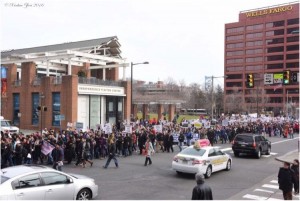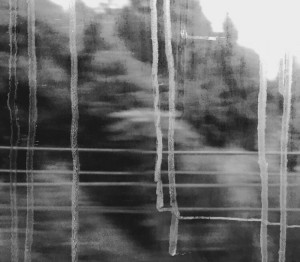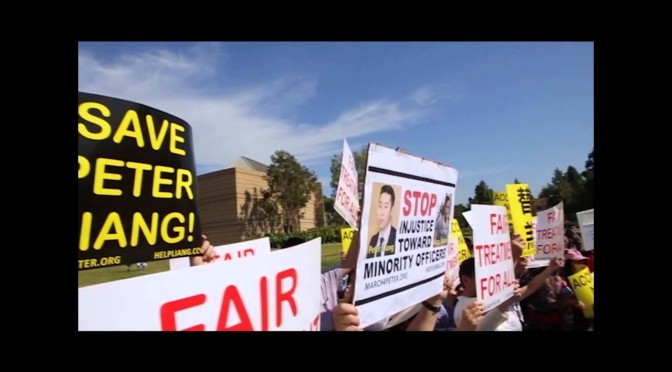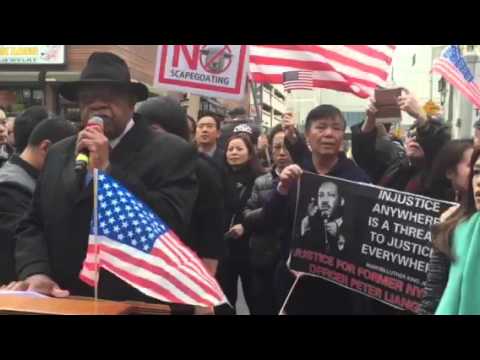Correspondence: Nancy R. Zhang (nrzhang@gmail.com), spokeswoman for Philadelphia’s 2/20/2016 #Justice4Liang Rally
On February 20, 2016, rallies held at more than 40 cities involving over 100,000 participants voiced loud and clear our deep and serious concerns over the conviction of former NYPD officer Peter Liang. Looking back, we are particularly disappointed with CAAAV’s hasty and misguided response to this tragic incident. We admire CAAAV’s dedication to serving the disadvantaged communities to which Akai Gurley belongs. However, we believe that CAAAV’s stance on this issue runs counter to the values of equality and justice on which the group was founded.
We disagree with CAAAV’s statement that Liang’s accidental shooting is “part of the systemic targeting of black people by the police” — Liang did not even see Gurley until minutes after Gurley was hit by the bullet, and hence this could not have been a race-inspired shooting. We disagree with their statement that the incident was “part of the institutional injustice we see everyday with law enforcement.” True, this tragic accident reflects deeper problems that pervade our law enforcement, but Liang’s act, of misfiring a bullet in to a wall in a pitch dark stairwell, is a far cry from the cases of police brutality that the CAAAV rightfully opposes.
Akai Gurley’s tragedy reveals inadequacies in the training that young NYPD police officers receive before taking to the streets. It reveals the dangers associated with NYPD’s policy of assigning teams comprised solely of inexperienced rookies to patrol New York’s most dangerous zones. It underscores the need for comprehensive security upgrades throughout New York’s public housing developments. Making Peter Liang a poster child for the city’s long-due response to police brutality is both unfair and counterproductive. It is unfair to Peter Liang. It is unfair to the past victims of true police brutality. It impedes progress by reinforcing the idea that responsibility for Gurley’s tragic death falls solely on the one individual at the frontlines, and not on the flawed system that placed him there.
We would also like to take this opportunity to clarify the misunderstandings reflected by the statements on CAAAV’s website.
- By supporting Peter Liang and protesting against his conviction, we are not arguing for Liang’s innocence. We are protesting against the conviction of second degree manslaughter, which we believe to be too harsh.
• By comparing the legal outcome for Liang’s case to the outcomes for the shooting of Michael Brown and the choking of Eric Garner, we are not voicing support for those past jury decisions. We invoke these past cases to emphasize the political pressures that served as a backdrop to Liang’s unfair ruling, and to highlight the selective prosecution that is so blatant in this case.
The tragedy of Akai Gurley’s death unfortunately happened amidst strained relations between NYPD and black communities. Yes, Black lives matter, but justice matters too. We admire CAAAV’s efforts to end racial injustice and empower Asian communities. However, we do not agree with CAAAV’s comparison of Liang’s incident with the shootings of Michael Brown and Rekia Boyd. These shooting incidents are clearly of a different nature. We hope that CAAAV, a group known for fighting injustice in America, can provide a more nuanced perspective on this complicated case.

